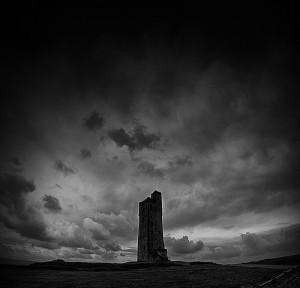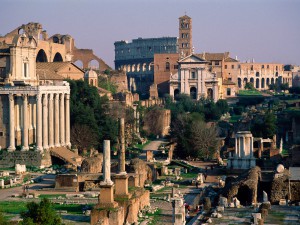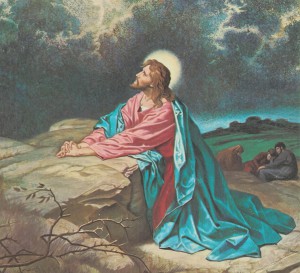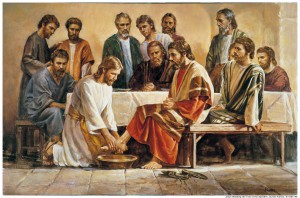 Though Jesus talks a lot about the kingdom of heaven, many Christians do not tend to think in kingdom terms. They believe that Christianity is a matter of church attendance and moral conduct—a lifestyle of nice rather than mean, clean rather than dirty, religious rather than secular. This is a cheap counterfeit of the kingdom as described in the Bible.
Though Jesus talks a lot about the kingdom of heaven, many Christians do not tend to think in kingdom terms. They believe that Christianity is a matter of church attendance and moral conduct—a lifestyle of nice rather than mean, clean rather than dirty, religious rather than secular. This is a cheap counterfeit of the kingdom as described in the Bible.
Kingdom in Scripture
Isaiah prophesied of Jesus in Isaiah 9:6-7:
6 For to us a child is born,
to us a son is given;
and the government shall be upon his shoulder,
and his name shall be called
Wonderful Counselor, Mighty God,
Everlasting Father, Prince of Peace.
7 Of the increase of his government and of peace
there will be no end,
on the throne of David and over his kingdom,
to establish it and to uphold it
with justice and with righteousness
from this time forth and forevermore.
The zeal of the LORD of hosts will do this.
The Jewish people expected their messiah to be a governmental king, which Jesus is, but on a deeper plain than earthly politics. His first act of public ministry was to preach this one-sentence sermon: “Repent, for the kingdom of heaven is at hand” (Matthew 4:17). He later taught his followers to pray, “Your kingdom come, your will be done, on earth as it is in heaven” (Matthew 6:10).
Now, In case you think all of this is too esoteric to be of any practical concern, remember Jesus’ alternative to anxiety, “Seek first the kingdom of God” (Matthew 6:33). Seeking the kingdom is another way of stating our function. I like to point to the Great Commands and the Great Commission to remind myself of what we are designed for: to love God and people by making disciples. But another way to state it is “seek the kingdom of God.” Seek his rule in your life; seek his rule in the world.
Furthermore, Jesus is coming back as the victorious King:
11Then I saw heaven opened, and behold, a white horse! The one sitting on it is called Faithful and True, and in righteousness he judges and makes war. 12His eyes are like a flame of fire, and on his head are many diadems, and he has a name written that no one knows but himself. 13He is clothed in a robe dipped in blood, and the name by which he is called is The Word of God. 14And the armies of heaven, arrayed in fine linen, white and pure, were following him on white horses. 15From his mouth comes a sharp sword with which to strike down the nations, and he will rule them with a rod of iron. He will tread the winepress of the fury of the wrath of God the Almighty. 16On his robe and on his thigh he has a name written, King of kings and Lord of lords. (Revelation 19:11-16)
Jesus will not look like Mr. Rogers when he returns, sitting down to gently change his shoes and sweater. He’ll look like King Arthur-meets-Braveheart, with many crowns and a blood splattered robe. He will be on a white horse, flanked by an angelic army.
 Saying that Christianity is about church attendance and morality is like saying America is about driving cars and speaking English. Those are merely a couple of the things we do as citizens of this nation. America is more truly about “one nation, under God, with liberty and justice for all. “
Saying that Christianity is about church attendance and morality is like saying America is about driving cars and speaking English. Those are merely a couple of the things we do as citizens of this nation. America is more truly about “one nation, under God, with liberty and justice for all. “
Christianity is not a matter of nice rather than mean, clean rather than dirty, religious rather than secular. It is about one nation drawn from many nations into an eternal kingdom. Jesus, the ultimate king, is building the ultimate kingdom by pardoning rebel sinners from all nations, granting them full citizenship and posting them in this hostile world as his royal ambassadors. As Christians, we are more than church goers and nice folks—we are men and women of the true king, citizens of the true kingdom.
Kingdom in Parables
Yet so much about this kingdom remains mysterious and unexplained. Since it is invisible, we cannot see its stone walls and towers, or find it on a map. We cannot see our king on his throne. We will never fully grasp the glory of the kingdom until the king returns and fully establishes his rule. I think it is too glorious for us in our present state to completely understand it.
One reason I think this is because Jesus mainly taught about it in parables, small stories illustrating big realities. He tantalizes us with descriptions that expand our understanding while leaving the mystery intact. Jesus describes the kingdom’s likeness rather than its essence, saying, “The Kingdom of heaven is like...” Look at these examples from Matthew 13:
- Like a man sowing good seed in a field (Matthew 13:24)
- Like a mustard seed (Matthew 13:31)
- Like a woman hiding leaven in flour (Matthew 13:33)
- Like a treasure hidden in a field (Matthew 13:44)
- Like a merchant finding a valuable pearl (Matthew 13:45)
- Like a net containing both good and bad fish that must be sorted (Matthew 13:47)
In light of all this, I will not attempt a clear definition either. I will simply point you to one of these parables.
Matthew 13:31-32
31He put another parable before them, saying, “The kingdom of heaven is like a grain of mustard seed that a man took and sowed in his field. 32It is the smallest of all seeds, but when it has grown it is larger than all the garden plants and becomes a tree, so that the birds of the air come and make nests in its branches.”
The mustard seed was a common image used to denote remarkable smallness. It was a tiny seed that grew into a surprising large plant, 8 to 12 feet tall, able to shelter many bird nests. How is God establishing his kingdom? The same way one establishes a massive mustard plant, with a remarkably small seed.
You can see the truth of this parable when you think back over what God has done. King Jesus did not first enter the world in a purple robe on a red carpet surrounded by blaring trumpets, but as fetus in the womb of a young girl in a small town, subhuman by some standards today. His public ministry was not heralded with billboards and commercials and fliers, but with a single-sentence sermon in a rural area. His first followers were not proud and plentiful, but a dozen working class men. The Great Commission did not begin with a fleet of ships with Christian flags waving above, but with eleven stupefied men over a breakfast conversation. The church did not begin with an orchestrated launch, but with 120 people, about the size of Dulin’s Grove, in a prayer meeting.
Kingdom seeds are not big. Kingdom seeds are not small. Kingdom seeds are remarkably small, especially in contrast with how big a result they produce.
This means that Kingdom endeavors do not start large
Christian leaders love to “launch” things. Read leadership books and go leadership conferences and you will hear about launching new churches, programs, websites, books, etc. But kingdom endeavors are not launches; they are seeds. They are prayers, sermons, conversations, practical steps of obedience and the like.
This means that Kingdom endeavors will often feel too small
My wife and I were talking about the state of decay and danger around us this week. People are struggling deeply with dark, difficult and devastating things. People are dying and being captured by sinfulness. What can a couple of average people do in the face of all this?
It is easy to be discouraged when we think we have to launch huge initiatives to accomplish kingdom pursuits. But it is encouraging to remember that seemingly too small endeavors are the seeds of massive kingdom accomplishment. So pray the tiny prayer, have the tiny conversation and plant the tiny gospel seed. Take heart: true kingdom seeds often feel too small.
 This means that Kingdom endeavors will grow
This means that Kingdom endeavors will grow
My father-in-law planted an acorn in the woods with his grandchildren one day. The next time they visited, he knew they would want to check on their tree, so he went ahead of them and stuck a branch into the ground where they planted the acorn to give them a thrill. The kids were amazed at how their seed had “grown.”
It often seems like the tiny seeds we are planting are not growing fast enough and we can be tempted to prop up a fake tree—something to look like we are building the kingdom. This is unnecessary because when kingdom seeds take root, they will grow into massive kingdom trees.
For example, our weekly attendance has been waning for a while, which might prompt some to look for an artificial way to boost activity. But rather than looking for branches to stick in the ground, we must patiently seek the kingdom by prayer, responding to God’s word, encouraging one another, serving one another, doing the work of evangelists, remaining faithful, fellowshipping together—and trust God to provide the growth.
The Man Who Planted Trees
When I was a child, I remember watching The Man Who Planted Trees on PBS. It is a short animated film about a man who walked the countryside with a messenger bag full of seeds. Every few steps he would poke a hole in the ground with his walking stick, drop in a seed, and tamp the dirt over it with his foot. Then he would walk a little further and do the same again. This was his daily routine. Long after the man died, forests grew in his paths.
This is the way of the kingdom. God is planting in us and through us as we walk our daily route. The forest is growing in us and behind us.
Consider
I invite you to consider where you stand with the King. Are you still rebel sinner or are you a citizen under his rule? Consider how kingdom seeds have grown in your life and give thanks. Consider how you will seek thing kingdom today and this week. What steps of obedience and allegiance will you take? What steps of kingdom expansion will you take as an ambassador of Christ?
Discussion Starters
- Do you and the Christians you know think or talk about Christianity in “kingdom” terms? Why or why not?
- Read Matthew 6:25-34. How does seeking the kingdom of God relate to anxiety?
- What does it mean to “seek the kingdom?”
- Take a few minutes to read and discuss the six kingdom parables in Matthew 13. Which one do you find most striking? Why?
- Read Matthew 13:31-32. How should this parable affect the way we look at God’s work in our lives as individuals? Our church? How should it affect the way we go about ministry?
- What are some practical steps you plan to take to seek the kingdom?
- Pray together, requesting especially that God’s kingdom would come and that his will would be done on earth as it is in heaven.








